May 15, 2025 | 12:54 GMT +7
May 15, 2025 | 12:54 GMT +7
Hotline: 0913.378.918
May 15, 2025 | 12:54 GMT +7
Hotline: 0913.378.918
On November 5th in Hanoi, the first Workshop on Agriculture between Vietnam - Kyushu region, Japan took place in the online form.
The workshop received the participation of Deputy Minister of Agriculture and Rural Development Nguyen Hoang Hiep, Ambassador Extraordinary and Plenipotentiary of Vietnam to Japan Vu Hong Nam, Governor of Kumamoto Prefecture Kabashima Ikuo, Director of Kyushu University Research Institute Professor Nakao Miki, along with representatives from agricultural universities and enterprises of the two countries.
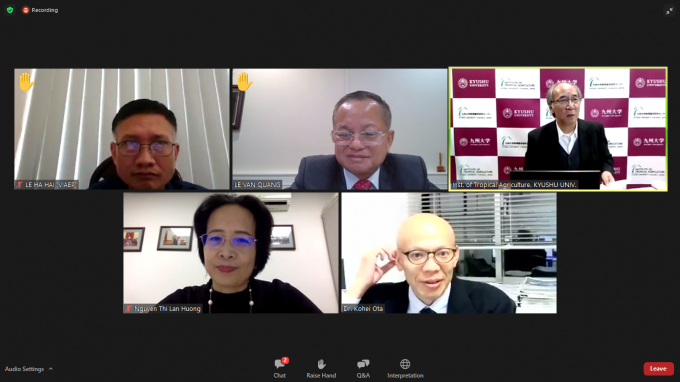
Delegates of the two countries exchanged information on the “seed” needs and projects to connect and develop bilateral agriculture. Photo: Hoang Giang.
Deputy Minister Nguyen Hoang Hiep said that the agricultural cooperation relationship between Vietnam and Japan has had deep and effective developments for many years.
According to the Deputy Minister, agriculture in the Kyushu region has an important position in Japan. The region is the home to many famous agricultural universities such as the universities of Kyushu, Kumamoto, Miyazaki, Kagoshima, etc. Kyushu University alone currently has nearly 50 master-degree and doctoral students from Vietnam.
This information partly speaks for the importance, prestige, attraction and agricultural cooperation relationship between the two countries in Kyushu. The0 Deputy Minister therefore highly appreciated the ideas and determination of Kyushu University and the Consulate General of Vietnam in Fukuoka upon successfully the Workshop on Agriculture between Vietnam - Kyushu region, Japan despite current difficulties.
Assoc. Hamanaka Daisuke, Kagoshima University, shared during the webinar about the "Fresh Bank" system that is being actively implemented in Japan. This is a fresh agro-products container system, a new solution for shipping companies to provide value-added services to customers.
This system focuses on three main features: The coolers are equipped with a device capable of generating an electric field inside to help the product stored inside achieve the best freshness. “Fresh Bank” can act as both a refrigerated container and a dry container at the same time while having the same volume and loading weight as a conventional refrigerated container. The system particularly ensures a safe and secure working process for users.
The “Fresh Bank” system has been tested and gave positive results, demonstrating long-term preservation for agricultural products, suggesting a great change in transport methods to save costs, reduce food loss and waste, and create high added value. Mr. Hamanaka hopes to be able to expand the market to other countries in the near future for this system.
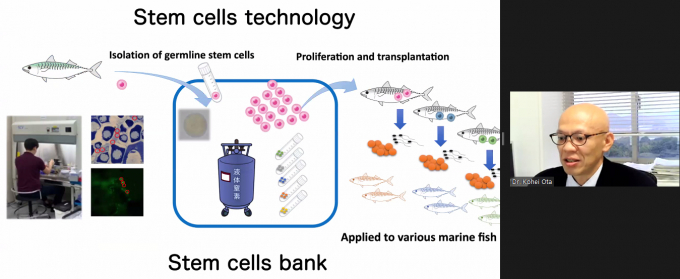
Mr. Ohta Kohei, Faculty of Agriculture - Kyushu University, shared about research on stem cell technology for saba fish. Photo: Hoang Giang.
Within the framework of the workshop, Mr. Ohta Kohei, Faculty of Agriculture - Kyushu University, shared the research model of saba fish farming which attracted a lot of attention from the participants, especially Vietnamese businesses.
Research shows that saba fish has the property of rapid freshness loss and are susceptible to infection of larvae or worms, so the Aqua-Biosecurity Innovation Center (ABRIC, Faculty of Agriculture - Kyushu University) in the rearing process has conducted egg selection and maintenance on the culture cycle to ensure that consumers will not be infected with harmful larvae.
Research on saba fish focuses on two directions including increasing productivity and improving production efficiency in order to develop the fisheries industry in the region while ensuring a sustainable supply of animal protein. ABRIC has deployed ICT equipment for remote feeding, using insects as a new food source, and creating a birth control system.
In particular, ABRIC has combined research on fish genetics and genome editing. Mr. Ohta Kohei said that saba fish have the habit of cannibalism (big fish eat small fish), so reducing this characteristic will improve the overall productivity of the litter.
Environmental pollution is one of the main reasons that cause genetic variation in animals. Genome editing will greatly contribute to the control of lifeline development, improving added value. Stem cell technology offers an opportunity to ensure fish productivity and improve quality as well as the potential for practical applications in the future, opening up expectations to develop more techniques for other objects such as fruits or other agro-products.
Answering questions from the delegates about matters surrounding fish genetics and genome editing, Mr. Ohta Kohei emphasized that gene editing technology to improve beneficial characteristics and reduce the load of harmful characteristics is completely acceptable, but the direct genetic modification of animals is considered prohibited practice. At the same time, gene editing requires careful research to successfully execute while avoiding risks.
Gene editing will be a technology that receives a lot of attention from international friends in the future. This technology can be applied to shrimp but more testing and research are needed.
On the Vietnamese side, Dr. Mai Van Tai, Research Institute of Aquaculture 1 (RIA1), also mentioned the bilateral cooperation between RIA1 and the Kyushu region having the goal of developing sustainable aquaculture industry. He hoped that both sides would establish projects to improve capacity in research and training, develop projects in specific fields, and create conditions for doctoral students of the two sides to have the opportunity to exchange and learn from each other.
Mr. Tai also affirmed the strengths and potentials of both sides in production development, environmental monitoring and efforts in the field of information technology in the fisheries sector (Bigdata construction, value chain management, traceability).
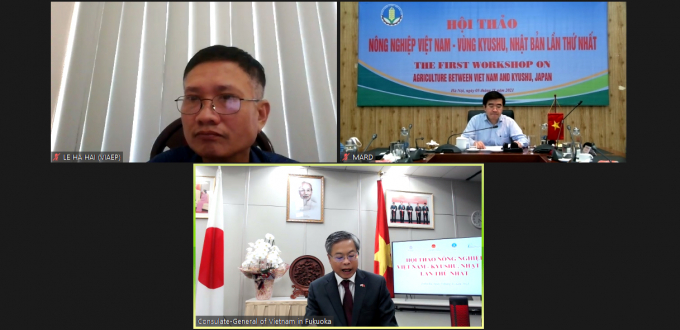
The delegates hope that Vietnam and Japan specifically the Kyushu region will have deeper and long-lasting cooperation. Photo: Hoang Giang.
Agriculture in Japan in general and the Kyushu region in particular is considered to be at the forefront of scientific and technological progress and investment. The agricultural sector is being mechanized and modernized very quickly, reflected in the strong application of information (IT) and artificial intelligence (AI) technologies into farming practices, collecting information in a multi-dimensional way, helping farmers quickly grasp the situation and offer appropriate solutions, ensuring crop and livestock productivity.
These advanced technologies are completely applicable to Vietnamese agricultural products, although their implementation may face many limitations due to the high initial investment costs.
Through the workshop, both sides believed that the agricultural cooperation between Vietnam and Kyushu region - Japan would open up new opportunities in agricultural research and development. This is especially meaningful for Vietnam in the context that the country is constantly striving to update advanced technologies in response to climate change and Covid-19 in the "new normal" situation, ensuring food security.
On the occasion of the first Workshop on Agriculture between Vietnam - Kyushu region (Japan), Deputy Minister Nguyen Hoang Hiep made a number of suggestions:
Firstly, the two sides continue to have specific connections and orders for practical cooperation on the basis of the inherent potential and advantages of each side, both in terms of scientific and business-commercial cooperation.
Secondly, the two sides consider building a periodic exchange mechanism within the framework of this activity (every 2-3 years), firstly on the 50th anniversary of relations between the two countries (1973-2023).
Thirdly, Vietnam wishes to receive more attention from the Government of Japan, relevant agencies and organizations of both sides to spread the results of the Workshop, considering this an initiative to contribute promote agricultural cooperation and relations between the two countries.
Translated by Samuel Pham

(VAN) Data from 10,000 farming households will help professionalize production organization and support the implementation of the One Million Hectares Program for High-Quality, Low-Emission Rice Cultivation.

(VAN) FAO Director-General QU Dongyu marks International Day of Plant Health at NENA conference.

(VAN) Deputy Minister of Agriculture and Environment Hoang Trung affirmed that floriculture and ornamental plants are a growing industry that receives significant global attention.

(VAN) The three staple crops dominating modern diets – corn, rice and wheat – are familiar to Americans. However, fourth place is held by a dark horse: cassava.
/2025/05/10/4037-3-223011_495.jpg)
(VAN) Remote sensing technology is becoming an indispensable tool in monitoring resources, developing modern agriculture, and protecting the environment in Vietnam.
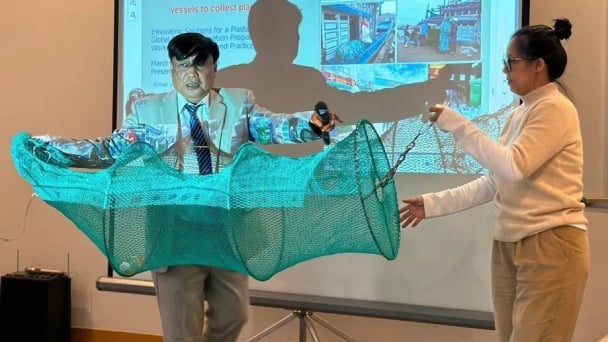
(VAN) The trash bag used on fishing vessels can withstand rough sea conditions, including level 8 to level 10 winds and waves. Notably, it can be hung anywhere on the boat.
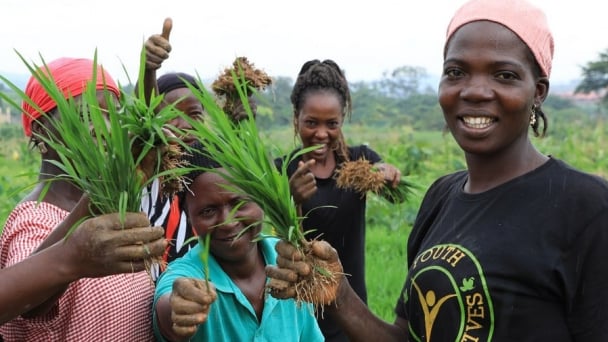
(VAN) African leaders launched the Kampala Declaration on Building Resilient and Sustainable Agrifood Systems in Africa, marking a bold step toward transforming the continent's agriculture.